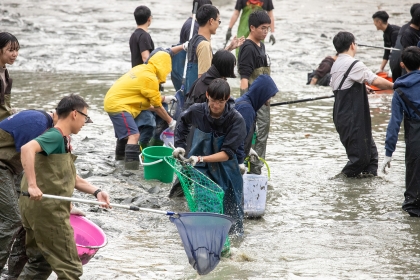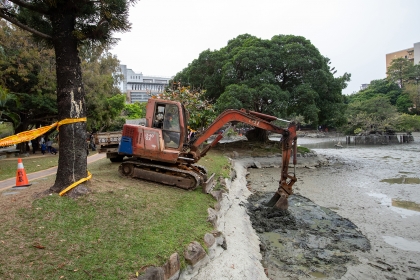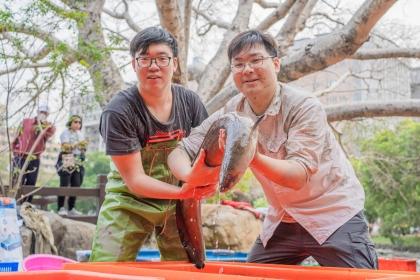Chung Hsing Lake Cleanup is the Largest Environmental and Ecological Education Event at an Artificial Lake in Taiwan
2024-03-14
興新聞張貼者
Unit秘書室
1,788
Over 100 people participated in a cleanup of Chung Hsing Lake in the largest environmental and ecological education event ever held at an artificial lake in Taiwan. The March 4-7 cleanup, a collaborative effort between NCHU and the central and local governments, cleared the lake of debris and silt that had accumulated since its construction in 1977. Environmental education was also incorporated into the event, which attracted participants from the faculty and students of the College of Life Sciences, College of Agriculture and Natural Resources, and College of Engineering as well as members of the Endemic Species Research Institute of the Council of Agriculture, the Agriculture Bureau of the Taichung City Government, and the Taichung Wildlife Conservation Association. With assistance from related organizations and the ecological and environmental scholars and experts of NCHU, the cleanup (which included partial silt removal, water quality monitoring, and removal of invasive species) went smoothly and ecological disruption was minimized.
At the end of the half-day event, nearly 300 fish and reptiles were removed from the lake. NCHU College of Life Sciences Dean Chieh-Chen Huang said that he hoped to use the opportunity to educate the faculty members and students, as well as the public, on the importance of ecological balance, and urged the public not to release invasive species.
Department of Life Sciences Assistant Professor Ren-Chung Cheng noted that silt buildup at the bottom of artificial lakes and increases in organic matter can lead to eutrophication over time. Periodic cleaning can help maintain water quality, support the removal of invasive species, maintain the living environment for indigenous species, and control animal populations within the lake.
Associate Researcher and fish specialist Kuei-Hsien Lin of the Wild Animals Division of the Ministry of Agriculture’s Taiwan Biodiversity Research Institute said that through this cleanup, several invasive species of fauna that could endanger the indigenous species were removed. Since the environment of Chung Hsing Lake is suitable for indigenous fish species of Taiwan, it will be possible to add more such fish as well as ornamental fish species that coexist well with the indigenous species. This integration of nature and culture will help turn Chung Hsing Lake into an exceptional venue for environmental and ecological education in this urban campus community.
At the end of the half-day event, nearly 300 fish and reptiles were removed from the lake. NCHU College of Life Sciences Dean Chieh-Chen Huang said that he hoped to use the opportunity to educate the faculty members and students, as well as the public, on the importance of ecological balance, and urged the public not to release invasive species.
Department of Life Sciences Assistant Professor Ren-Chung Cheng noted that silt buildup at the bottom of artificial lakes and increases in organic matter can lead to eutrophication over time. Periodic cleaning can help maintain water quality, support the removal of invasive species, maintain the living environment for indigenous species, and control animal populations within the lake.
Associate Researcher and fish specialist Kuei-Hsien Lin of the Wild Animals Division of the Ministry of Agriculture’s Taiwan Biodiversity Research Institute said that through this cleanup, several invasive species of fauna that could endanger the indigenous species were removed. Since the environment of Chung Hsing Lake is suitable for indigenous fish species of Taiwan, it will be possible to add more such fish as well as ornamental fish species that coexist well with the indigenous species. This integration of nature and culture will help turn Chung Hsing Lake into an exceptional venue for environmental and ecological education in this urban campus community.




